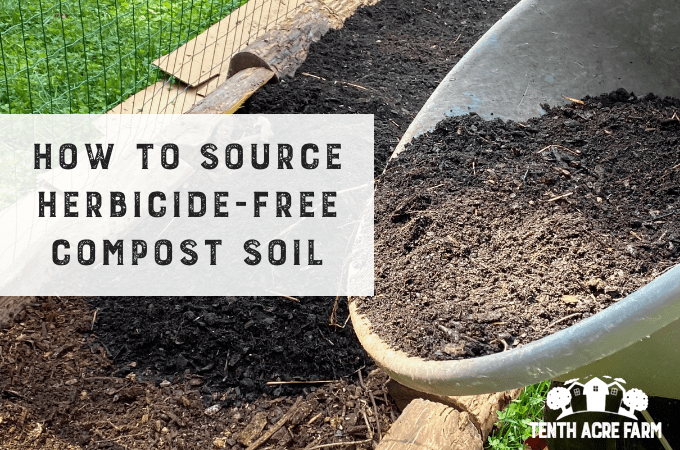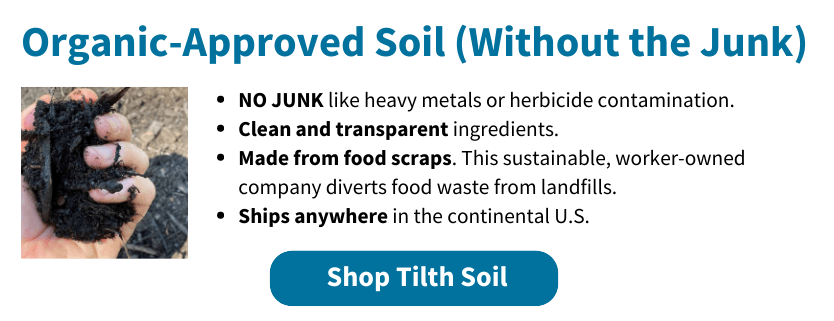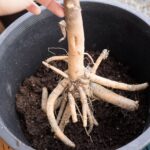How to Source Herbicide-Free Compost Soil
Compost soil used to be the foundation of organic gardens. That is, until persistent herbicide contamination became a concern in commercial facilities. Learn 5 essential questions to ask a soil producer before buying compost soil for your garden.


This page may contain affiliate links. Please read my disclosure for more info.
Note from Amy:
When I wanted to buy herbicide-free compost for my new gardens, I interviewed many compost soil companies and composting facilities using the interview process I’ve outlined in this article. One of these was Tilth Soil.
I was impressed by their above-and-beyond effort to keep herbicides out of their products, so I enthusiastically established a partnership with them. I’m pleased to be a Tilth Soil ambassador!
However, this relationship has no bearing on the research I’ve shared in this article. I’m passionate about the issue of herbicide contamination, and I hope this information helps you find a great source for high-quality compost soil!
The Problem with Persistent Herbicides in Compost Soil
Persistent herbicides have become pervasive in the organic matter that is collected and used to create bulk compost at commercial facilities. Materials like hay, manure, straw, and grass clippings are the most likely to be contaminated. In turn, this contamination is passed on to the bulk compost or bagged soil products that we buy.
In fact, rather than degrading the contaminant, the composting process can make the herbicide more concentrated in the finished product.
What’s more, the complete deactivation and breakdown of the contaminant in our gardens can take up to three or more years, causing stunted growth and lackluster performance in young perennial crops, annual vegetable crops, and flowers.
I wonder how many gardeners have blamed themselves for poor yields and sickly plants, when the real problem was herbicide contamination from purchased soil?
(If you make your own compost, read more about keeping persistent herbicides out of your compost bin, even if you garden organically and don’t spray.)


Tilth Soil compost
Avoiding Herbicide Contamination in Purchased Compost Soil
If avoiding herbicides is important to you, then you need to know what to look for in commercially made compost.
Bulk Mulch and Composting Facilities
Bulk mulch and composting facilities are allowed to collect certain types of organic materials depending on their license and/or permit from their state’s environmental department. However, these regulations don’t prevent materials that are laced with herbicides or other contaminants from being composted.
My friends at Catalyst BioAmendments explain it this way:
Most compost is based on the waste reduction model. Green waste is dropped off on site, the person dumping the material pays to get rid of their “waste”. Some of the materials dropped off are laden with chemicals, some are plants that have antimicrobial compounds, some loads are full of plastic trash, and some loads are lovely diverse organic materials. Recipes and ingredient quality are rarely considered.”
Creating a low-impact, regenerative society depends on composting organic waste and transforming it into a resource. I applaud facilities that accept contaminated waste because they are closing a loop—transforming that waste into a clean resource.
However, it’s important for the composting process to address any potential contaminants in the raw materials. Herbicide-contaminated waste, for example, may need to compost for longer periods of time or at different temperatures. And the finished product may need to be verified via testing that it’s free of contaminants.
Although most facilities are required to submit annual testing for heavy metals, herbicide testing is currently not required.
In addition, most facilities do not intend for their products to be used for agricultural purposes. As a result, they are not tested for safety as such.
Below, we’ll discuss the questions to ask a producer to learn more about their products and composting process.


I’m creating new garden beds using compost soil from Tilth Soil.
Bulk Soil from “Farmy” Good Guys
I recently discovered a local composting facility that had farm in their company name and a pleasant, “farmy”-themed website. They “love to help others grow their own food organically and give locally grown food to both food banks and soup kitchens.”
They state that their compost is “made from yard waste, forest waste and organic matter. Made naturally and never with any chemicals.”
I really want to like these “farmy” good guys and buy their products! What a wonderful asset to our community—a business that turns local waste into a resource with a focus on food production and helping those in need!
Unfortunately, when I contacted the owner, he wasn’t aware that yard waste and organic matter could be laced with herbicides. They do not test their products for herbicides, pathogens, heavy metals, or other contaminants, so there’s no way of knowing if their products are safe.
These guys have the potential to do good. However, they’re missing a way to verify that their final product has the quality that they’re promising. I wouldn’t feel comfortable using their compost soil in my garden until they have some accountability in place, something we’ll address in the interview questions below.
Would you like to yield delicious harvests while partnering with nature? Check out my mini guide, The Permaculture Inspired Vegetable Garden.
My Favorite Compost Soil and Soil Mixes
At my first 0.10-acre home, I used compost from a bulk mulch supplier as well as horse manure from local stables to build gardens and improve soil.
I had no idea that this was a double whammy to my garden’s health!
Of all the manures, horse manure has one of the highest chances of being contaminated with herbicides. I was completely unaware of this risk, and I believe that my gardens demonstrated lackluster performance because of it, despite my commitment to ecologically sound gardening practices.
Now at my new home, I’m beginning to develop new food gardens, which takes A LOT of soil. Although I’m creating compost in my own compost bins, it’s not quite enough for this beginning phase.
So I wanted to purchase THE BEST compost soil from a responsible producer that checks all the boxes for a healthy and safe product.
First, I searched locally and was disheartened by what I found. Not a single local company could ensure a clean finished product. In fact, I was surprised to find that NONE of them tested their product for agricultural safety or herbicide contamination.
I then searched online for companies that make and ship junk-free compost soil, and that’s when I found Tilth Soil in Cleveland, Ohio. Tilth Soil produces biologically active compost and soil mixes that are approved for use in certified Organic agriculture.
Their soil products are formulated specifically to support nutrient cycling, seed germination, root development, and improved plant health over time.
I interviewed them using the five questions I’ve outlined below. They were generous with their time, transparent about their challenges, and I learned a lot about the commitment required to produce top-notch compost soil.
It was a match made in heaven! The soil I received is rich, dark, and full of life. My gardens have thrived in their first year, which has made me a super fan of their products!
Interview the Source: 5 Questions to Ask When Buying Compost Soil
When searching for clean, herbicide-free compost soil, I recommend asking producers the following five questions. I’ve included findings from my discussions with the folks at Tilth Soil as an example.
1: What are the primary ingredients of the compost soil?
The producer should know what raw materials go into the product, as well as the source of each. Remember that grass clippings, hay, manure, and straw are the most likely to be contaminated with herbicides.
To clarify, these are, in general, excellent materials for making compost. However, because of unchecked herbicide use in farms and yards, the inclusion of these materials in compost now increases the likelihood that the finished product will also be contaminated.
It’s unfortunate that herbicides have become rampant in the very natural and essential process of transforming waste into a resource.
Tilth Soil creates compost primarily from food waste, which is less likely to be contaminated with herbicides or heavy metals. Even with this benefit, however, they’ve taken additional measures to remain herbicide free, as I’ll detail below.
While it’s not necessarily a deal-breaker if a composting facility accepts potentially contaminated organic matter, knowledge that they do can help you ask follow-up questions to ensure they’re handling it appropriately and can ensure an herbicide-free finished product.
Therefore, knowledge of the primary ingredients is the first step in your detective work.


Tilth Soil collects food waste from the local community for making compost soil.
2: Does the soil company or its products have any accreditations or certifications?
In other words, is there third-party oversight?
There are many voluntary accreditations that demonstrate a commitment to accountability, a clean product, and a clean environment.
With regard to compost, the USDA National Organic Program (NOP) states:
The producer must manage plant and animal materials to maintain or improve soil organic matter content in a manner that does not contribute to contamination of crops, soil, or water by plant nutrients, pathogenic organisms, heavy metals, or residues of prohibited substances [such as herbicides].”
Many bagged soil products are voluntarily accredited by OMRI, the Organic Materials Review Board. Products bearing the OMRI Listed® seal have been reviewed and determined to be in accordance with NOP standards.
The US Composting Council (USCC) also has a Seal of Testing Assurance (STA) certification program, which monitors manufacturers with annual testing for heavy metals and pathogens and makes data sheets available for customers.


Nathan Rutz, the soil director at Tilth Soil, is certified through USCC.
Compost soil and soil mixes from Tilth Soil, for example, are produced in compliance with the NOP. They’re approved for Organic use by the Ohio Ecological Food and Farm Association (OEFFA), Midwest Organic Services Association (MOSA), as well as being KIND Certified (the Organic equivalent for legal cannabis growers).
In 2019, Tilth Soil was awarded the Small Composter of the Year Award by USCC, and advocated successfully for state-wide rule changes to support community-based composting efforts.
Interestingly, a soil producer following the guidelines of the NOP can use inputs that are not certified Organic:
Imagine if all of the organic matter—food scraps, hay, straw, manure, yard waste, etc.—needed to be certified Organic for it to be used in a composting facility. This would significantly increase production efforts and most certainly render the final product cost prohibitive.
My point is that even NOP-approved compost soil may have persistent herbicide contamination in the primary ingredients, as well as in the final product.
Ultimately, third-party certification examines the supply chain and processing, and requires some testing of the final product. Although it isn’t a declaration of being herbicide free, accreditations demonstrate a commitment to integrity and a clean product.
3: Is the compost soil tested? If so, what tests are conducted?
I incorrectly assumed that herbicide testing would be required for NOP-approved compost production and/or for state permitting. On the contrary, compost soil and soil mixes that are approved for use in Organic agriculture are not tested for herbicides.
Even “the EPA has no standard procedures for testing persistent herbicides in compost or feedstocks down to the levels at which garden plants are affected.” Additionally, the USCC believes that herbicide testing is financially impractical for producers.
I tend to agree on principle.
Our current system uses taxpayer money to subsidize harmful chemical agriculture, and chemical companies contribute to the pollution of the environment without taking on risk or responsibility.
Meanwhile, certified Organic farmers and NOP-approved producers are required to pay fees for ‘certification’. They take on all of the risk, cost, and extra effort to clean up the contamination and produce a safe product.
Still, as we learned above, persistent herbicides can be more concentrated in the finished compost soil product because of the reduction in volume of the organic material during the composting process.
Therefore, I believe it’s essential to support producers who are going the extra mile. They’re creating the infrastructure and amassing the knowledge needed for the next generation of more responsible businesses.
Ultimately, producing an herbicide-free product comes down to the motivation, commitment, and integrity of the producer to go beyond the requirements of state regulatory departments and the NOP.
Tilth Soil is no stranger to the potential threat of herbicide contamination:
When a customer reported leaf curling, a tell-tale sign of herbicide contamination, they jumped into action. They immediately sent a compost sample away for a chemical residue lab test. The results showed numbers well below effective levels, and the customer ultimately attributed the leaf curl to an unrelated humidity problem.
However, Tilth took extra steps after that incident to ensure a clean product going forward:
First, they encouraged their site’s neighbors to abide by herbicide regulations to reduce the possibility of aerial drift or surface water contamination in the composting facility.
Next, they spoke to a handful of experts on the matter—from university researchers, to the USCC chairperson, to fellow soil producers who had recovered from contamination—to learn about best practices.
Finally, they expanded their practice of conducting a monthly bioassay, a canary-in-the-coal-mine test that uses legumes as an indicator of persistent herbicides.
Tilth was already conducting regular bioassays using cucumbers, lettuce, and cherry tomatoes for quality assurance and to test for contamination issues. However, the addition of legumes, such as peas and clover, has given them additional peace of mind with regard to detecting persistent herbicides. None of their seedling tests have ever displayed any issues.
Ask for copies of test results or ask for a soil sample to perform your own test before buying.
You can ask the facility for results of an herbicide/pesticide test, or request that they perform one. Alternatively, ask for a sample of the product and perform your own green bean herbicide test (bioassay) before purchasing.


Tilth Soil conducts monthly bioassays for quality assurance.
Additional Testing on Compost Soil
There are many possible tests that an individual composting facility can conduct. State-regulated facilities submit an annual compost lab analysis. This tests for things like soil pH, soluble salts, pathogens, heavy metals, and more. You can request a copy of these results.
Tilth runs regular compost lab analyses, focusing on appropriate levels for agricultural activities.
Agriculturally focused producers often run further tests to ensure their product is optimized for growing healthy crops. For example, Tilth also analyzes the microbiology of the compost soil, which I’ll discuss next in question 4.
In the end, testing compost soil is site-specific. Government regulations, certifications, raw material sources, and the goals and motivations of the producer all come into play.
Rather than simply fulfilling a requirement, however, testing is integral to the composting process for high-quality, agriculturally focused producers.
Interested in learning more about improving the soil in your permaculture garden?
You’ll find loads of information like this in my award-winning book, The Suburban Micro-Farm.
4: Does the producer demonstrate knowledge of, or an interest in, soil ecology?
An interest in soil ecology may not identify a soil producer that creates herbicide-free products. However, it can help distinguish producers who understand the effect that herbicides may have on soil biology.
Soil products that are approved for Organic agriculture, such as those that are NOP approved or OMRI listed, aren’t automatically alive with biological activity. In fact, many bagged products are quite inert and lifeless.
Biologically active soil, on the other hand, can cycle nutrients. This, in turn, supports root development and plant growth without relying on artificial chemicals or fertilizers.
Therefore, I like to know if a producer prioritizes living compost soil, and what steps they take to do so.
For example, Tilth Soil tests each batch of finished soil for the presence of diverse populations of microbiology, fungi, and good bacteria, as well as the absence of bad bacteria. This is an extra step that few soil producers take.
A producer may claim to include “living” components in their soil mix, such as compost or worm castings. However, without testing, it’s hard to know if biological activity is actually present and beneficial in the finished product.


5: What considerations does the producer give to sustainability or environmental issues?
Sustainability can take many forms, from closing waste loops to reducing carbon miles in the supply chain; from considering the quality of raw materials to the impact of the final product on the environment.
Tilth Soil decided to address food waste, which is filling landfills at an alarming rate. In fact, over 27 million tons of food ends up in landfills in the U.S. every year.
There is no such thing as ‘away’— when we throw things away, it must go somewhere.” ~Annie Leonard, The Story of Stuff
This food waste is contributing to methane production, a greenhouse gas that exacerbates climate change. By transforming food waste into an agricultural resource, Tilth contributes to the reduction of methane in the environment.
Of course, simply caring about the environment or local community is not enough to ensure herbicide-free compost soil. Still, it is one piece of the grand search for a producer who is aligned with our goal of growing safe and healthy crops.
What sustainability or social issues are important to the producer?
For example, transforming manure into compost soil is a great way to close a waste loop while providing a rich amendment for the garden. However, if the manure is laced with herbicide from straw, hay, or pasture, what steps is the producer taking to remediate it and ensure a clean finished product?
An interest in sustainability and a clean environment is not enough by itself to ensure herbicide-free compost soil. However, it’s one factor in finding a producer who is committed to creating a clean product.
Summary
Persistent herbicides are ubiquitous in our environment and have contaminated even the most ecologically sound gardens and farms. So, although compost soil used to be a great way to boost garden success, it now requires close scrutiny.
I’m thankful to have found a compost soil producer that goes the extra mile to ensure an herbicide-free product. Check out the products at Tilth Soil.
By asking the right questions, you can select a responsible producer and source clean, herbicide-free compost soil for your garden.
5 FAQs About Sourcing Herbicide-Free Compost
#1: Do herbicides break down in compost?
Most herbicides break down in compost. However, the complete deactivation and breakdown of the contaminant can take up to three or more years, causing stunted growth and lackluster performance in young perennial crops, annual vegetable crops, and flowers.
#2: How long do herbicides last in compost?
Persistent herbicides can last in compost for three or more years before completely breaking down into inert compounds.
#3: Which raw materials are the most likely to be contaminated with herbicides?
Materials like hay, manure, straw, and grass clippings are the most likely to be contaminated, passing on that contamination to the bulk compost or bagged soil products that we buy.
#4: Are bulk mulch and composting facilities required to test for herbicides?
Herbicide testing is currently not required. In addition, herbicide testing is not even required for Organic certification and/or for state permitting.
#5: Are there any accreditations or certifications that can help me find herbicide-free compost?
There are a few voluntary accreditations, such as OMRI, NOP-approved, USCC, etc., which may demonstrate a producer’s commitment to accountability, a clean product, and a clean environment. However, this does not guarantee that the products are herbicide-free. Don’t be afraid to ask a producer what actions they take (if any) to address herbicides in their composting process, or to request a sample and conduct your own green bean herbicide test.










